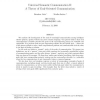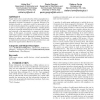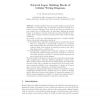139 search results - page 12 / 28 » How Common Can Be Universality for Cellular Automata |
ECCC
2008
13 years 7 months ago
2008
We continue the investigation of the task of meaningful communication among intelligent entities (players, agents) without any prior common language. Our generic thesis is that su...
CIE
2007
Springer
14 years 2 months ago
2007
Springer
The intuition guiding the de…nition of computation has shifted over time, a process that is re‡ected in the changing formulations of the Church-Turing thesis. The theory of co...
AOIS
2006
13 years 9 months ago
2006
People tend to form social networks within geographical areas. This can be explained by the fact that generally geographical localities correspond to common interests (e.g. studen...
COLT
1995
Springer
13 years 11 months ago
1995
Springer
We propose and analyze a distribution learning algorithm for a subclass of Acyclic Probabilistic Finite Automata (APFA). This subclass is characterized by a certain distinguishabi...
RECOMB
2007
Springer
14 years 1 months ago
2007
Springer
Publicly-available data sets provide detailed and large-scale information on multiple types of molecular interaction networks in a number of model organisms. These multi-modal univ...



